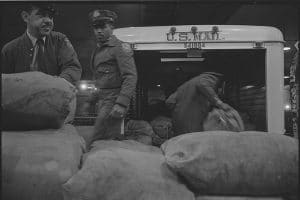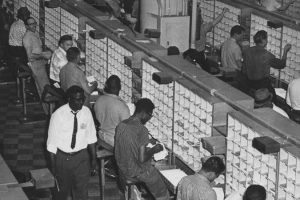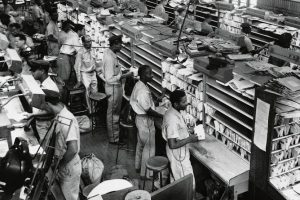A reality not often talked about is the immense role played by black postmen in the creation of the black middle class.
We’ve always had singular, exceptional people like Frederick Douglass and George Washington Carver. But they are always presented as exceptional and occasional, with decades, even centuries between them.
In our community, though, work in the U.S. Postal Service represented the first gigantic movement of black men into middle-class status. They were the first line of entry, and this was the work they did to make and maintain middle-class lives for themselves and their families. This was the work they did to buy homes and put their children through school.
They carried huge mailbags, slung over their shoulder, with catalogues inside. And they walked.
They arrived at our houses every day and on time; in fact, at the same time each day!
They always had time to talk a minute or two with neighbors and friends on their route.
We know and remember their names:
- Richard McAllister — Dr. Jane Ellen McAllister’s father, who supported her study and aspirations with his work as a postman here;
- Percy Strothers — World War II hero, who helped found an entire subdivision of black middle-class homes here;
- Henry Floyd — who sent one son to Yale and his 10 other children to equally impressive places, was also the first African American to serve as Postmaster of Vicksburg;
- Euphytee Williams — has poll tax receipts from the days here when he paid to vote, and whose daughter is an architect;
- Harrison Havard Jr. — whose four daughters are all highly-accomplished and whose son is a human resource manager;
- Percy Taylor — father of Dr. Malcolm Taylor, one of the most sought-after heart specialists of our time;
- Lonnie Boykins — father of Brian Boykins, chief of staff to Vicksburg Mayor George Flaggs Jr., and holds a master’s in political science;
- Joe Woodson, H.C. Berry, Tom Money, Sr., Reuben Corbin Smith, Francis Robbins, James Brown, and countless others.
These were the men who engaged the culture that the civil rights struggles had promised. But it was never an easy path.
Initial resistance to their employment became resistance to their advancement. Long waits up the ladder were common.
But in both their public and private lives, these men persisted.
When men marry, they choose homes, neighborhoods, and children — and better choices for those children than they had for themselves.
Vicksburg’s African American postmen were participants and activists as well. Mr. Williams helped found new Kiwanis when the old ones would not let him in. And they cut their yards, taught manners to their children, and made sure that they stayed in school.
In these models of exemplary men, civic virtue was at its highest, and in their wake came all the familiar success: black bank tellers, black policemen and firemen, black mayors and teachers, black doctors, lawyers, journalists.
And all who came in their wake.
Yolande Robbins is a community correspondent for The Vicksburg Post. You may reach her at yolanderobbins@fastmail.com.



